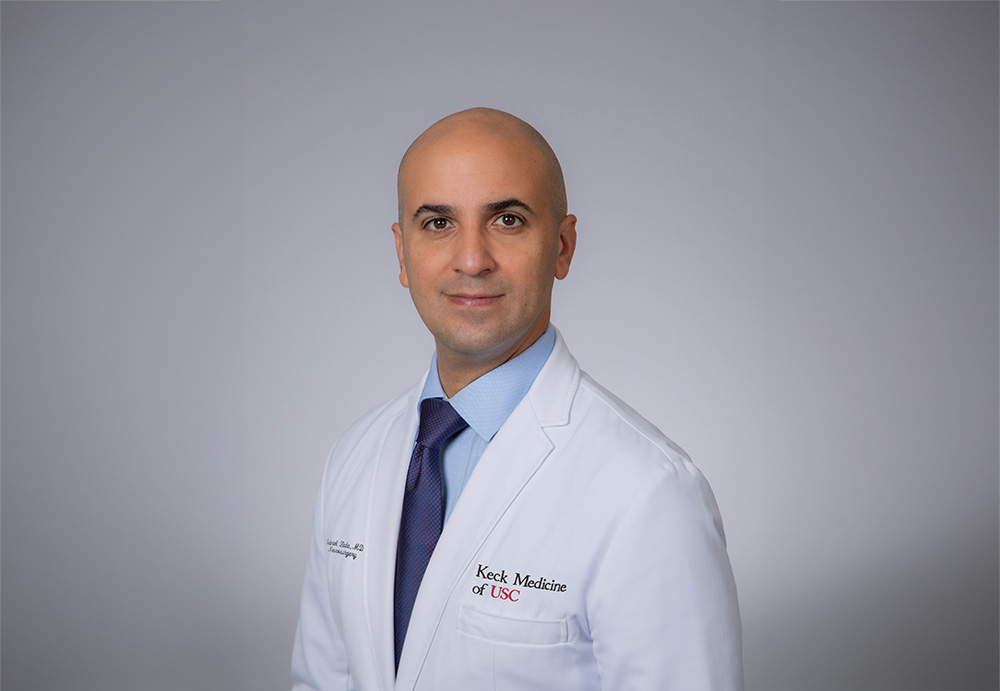
Gabriel Zada, MD, Director of the USC Brain Tumor Center, gives tips to elevate your clinical program in a competitive health care market.
In my time as a neurosurgeon, I’ve treated over 3,000 patients with brain and skull base tumors using both minimally invasive and open cranial approaches. As Director of the USC Brain Tumor Center, part of Keck Medicine of USC, I direct a comprehensive, minimally invasive cranial surgery program. I also co-direct the USC Stereotactic Radiosurgery Center at Keck Medicine. In these roles, I’ve learned how to elevate a clinical program to stand out in a large metropolitan area.
Here are five of the principles I put in place with my work at Keck Medicine of USC.
1. Put yourself in the patient’s shoes.
One of the most important ways to realize where you might have opportunities to improve your center or clinic is to put yourself in the patient’s shoes and think about fragmented care and the journey of the patient and caregivers.
We have all been patients and can understand the frustration of having to wait weeks for multiple appointments with varying specialists — all to be treated for the same condition. If we adopt the patient’s perspective, thinking about what we would want if we were diagnosed with a certain condition, such as a brain tumor, that’s when we start to realize opportunities for coordinating care in a way that is more efficient for the patient and that will provide them with a higher quality of care and more satisfaction.
2. Get the word out about your innovations and differentiators.
After you’ve made innovations in care from a patient perspective, you need to tell people about them. It takes a lot of hard work to distinguish yourself against your local and national competitors, but once you do so, that work needs to be broadcast through marketing and media so that people in your area are aware of the differentiators you’ve worked hard to achieve.
3. Start early to nurture new generations of neurosurgeons.
Finding good talent requires fostering interest in students in your community. At the USC Brain Tumor Center, we really work to inspire excitement in young students throughout Los Angeles. This starts at the high school and undergraduate level, where we do outreach and mentorship.
Importantly, this also helps level the playing field. There’s one student I’ve been mentoring for over a decade who I first began working with while he was in high school in East Los Angeles. He then went on to community college, transferred to the University of Southern California and then attended the Keck School of Medicine of USC. He’s currently taking a year off from medical school to do research, then plans to apply to a neurosurgery program next year.
This is the kind of support and dedication it takes to help diversify your cohort of neurosurgeons.
4. Make sure your employees feel challenged and motivated.
We check in with all of our physicians and staff regularly to make sure that they’re feeling challenged and motivated. Occasionally we must retain them, because we do work in a competitive landscape. But people feel happiest when they can contribute to the team in a variety of ways and feel a sense of purpose. We make sure that no matter what their role is in the institution — whether it’s a nurse or a front desk representative — our employees feel valued and acknowledged.
5. Ensure everyone has a stake in your clinical mission.
Everyone needs to buy into your clinical team’s mission for the mission to be successful. To do so, your mission has to feel real and authentic to your employees.
At the USC Brain Tumor Center, our number one mission is to offer the most advanced care for brain tumors. Number two is pursuing research in an effort to cure brain tumors. All of us here are aligned on those two fronts. As anyone in our brain tumor center can tell you, we collectively work on those goals together.
Topics
